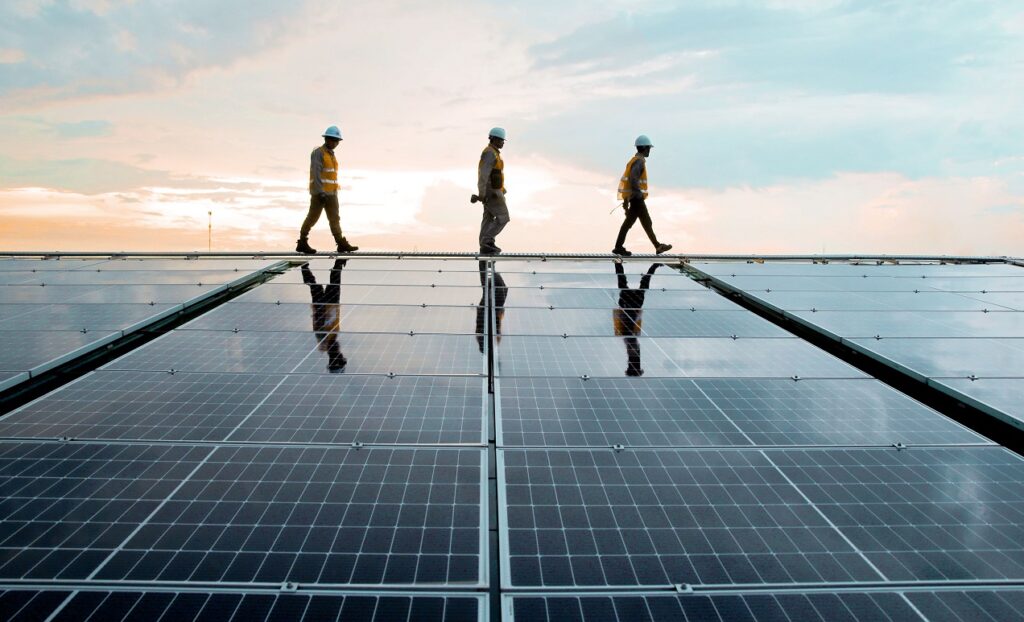Unveiling the Power Play: AC-Coupled vs. DC-Coupled Battery Energy Storage Systems in Rooftop Solar
- By user

As rooftop solar installations continue to surge in popularity, the quest for efficient energy storage solutions has become paramount. Among the key considerations for homeowners and businesses alike is choosing between AC-coupled and DC-coupled battery energy storage systems. In this comprehensive guide, we will explore the nuances of these two approaches, shedding light on their differences and helping you make an informed decision for your rooftop solar setup.
1. Understanding the Basics: AC-Coupled and DC-Coupled Systems
Before we dive into the differences, let’s establish a foundational understanding of AC-coupled and DC-coupled battery energy storage systems.
AC-Coupled System:
In an AC-coupled system, the solar panels generate direct current (DC), which is then converted into alternating current (AC) by the solar inverter. This AC electricity is used to power your home, and any excess can be sent back to the grid or stored in a battery through a separate inverter. That means that the solar system and the battery system each have their own inverter set-up.
DC-Coupled System:
Conversely, a DC-coupled system integrates the battery directly into the DC circuit of the rooftop solar plant. This means that the rooftop solar plant produces DC electricity, which is then stored directly in the battery without the need for an additional inverter. The DC power is converted to AC only when it is needed to power appliances.
Now, let’s delve into the distinctions between these two systems:
2. Efficiency: AC-Coupled Offers Flexibility, DC-Coupled Maximizes Efficiency
One of the primary differences lies in the efficiency of energy conversion. In an AC-coupled system, the conversion from DC to AC happens twice—once from the rooftop solar plant to the grid and again when drawing from the battery. This double conversion can result in some energy losses.
On the other hand, DC-coupled systems are renowned for their higher efficiency. By bypassing the need for a separate inverter during energy storage, DC-coupled systems minimize conversion losses and maximize the amount of solar energy directly stored in the battery.
3. Retrofitting and Scalability: AC-Coupled Takes the Lead
When it comes to retrofitting an existing rooftop solar setup or expanding the system in the future, AC-coupled systems showcase their flexibility. Adding a battery to an AC-coupled system is often a simpler process since it involves integrating an additional inverter dedicated to the battery.
DC-coupled systems, while highly efficient, can be more complex to retrofit or expand.
4. Battery Compatibility: AC-Coupled Supports Diverse Batteries, DC-Coupled Demands Specifics
AC-coupled systems have the upper hand when it comes to battery compatibility. Since the battery is connected to the grid via an inverter, it can be more easily swapped or upgraded without significant alterations to the rooftop solar setup. This flexibility allows one to choose from a wider range of batteries, promoting adaptability.
Conversely, DC-coupled systems often demand specific batteries that can directly handle DC input. While this limitation might restrict options, it ensures that the chosen battery is optimized for direct DC charging, potentially resulting in higher efficiency.
5. Cost Considerations: AC-Coupled is Generally More Affordable
In terms of upfront costs, AC-coupled systems often present a more budget-friendly option. The components for AC-coupled setups, including inverters, are typically more widely available and competitively priced. Additionally, the simplicity of retrofitting or expanding AC-coupled systems can contribute to overall cost-effectiveness.
DC-coupled systems might involve a higher initial investment due to the specialized components required for direct DC charging. However, the potential efficiency gains and long-term savings on energy bills could balance out the initial cost difference.
Conclusion: Choosing the Right Fit for Your Rooftop Solar
In the grand debate of AC-coupled vs. DC-coupled battery energy storage systems for rooftop solar, there’s no one-size-fits-all answer. The decision hinges on your specific needs, preferences, and the existing conditions of your solar setup.
If flexibility, ease of integration, and grid interaction are high on your priority list, an AC-coupled system might be the ideal fit. On the other hand, if you prioritize maximum efficiency, especially in regions with frequent power outages, a DC-coupled system could be the game-changer.
Ultimately, both AC-coupled and DC-coupled systems bring unique advantages to the table. As the solar industry continues to evolve, advancements in technology may further bridge the gaps between these two approaches. To make the most informed decision, consult with a solar professional who can assess your specific situation and guide you toward the energy storage solution that aligns perfectly with your rooftop solar ambitions.

cerebrozen reviews
April 3, 2024 at 1:33 pmI sincerely admired what you’ve produced here. The sketch is elegant, your written content chic, yet you appear to have developed some anxiety regarding what you aim to offer thereafter. Certainly, I shall return more frequently, just as I have been doing almost constantly, should you uphold this incline.